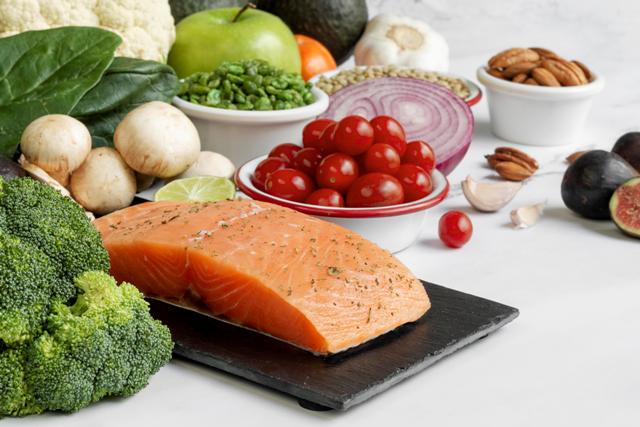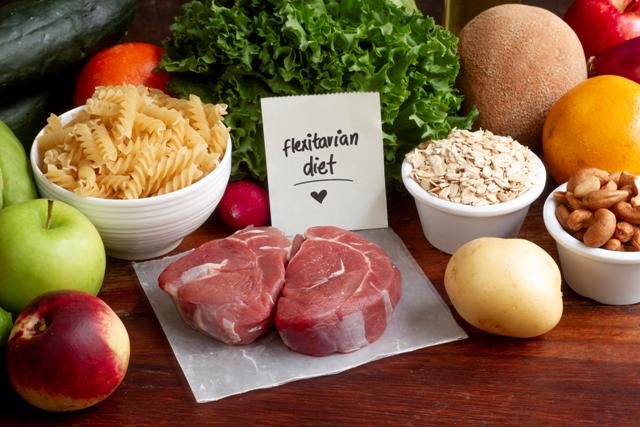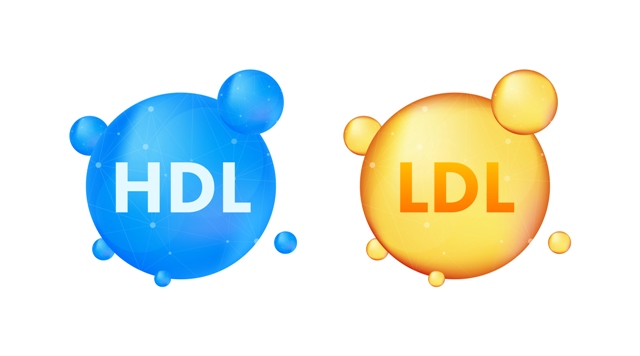Flexitarian Diet is a special type of diet that encourages the consumption of plant based food mostly but also allows animal foods like meat in moderation. The word flexitarian is obtained from two words, flexible and vegetarian. Individual who want to include more plant foods in their diet or who want to consume a vegetarian diet but do not want to completely cut out meat then they should go for Flexitarian Diet. It is more flexible than vegan or fully vegetarian diet.
Vegetarians generally exclude meat from their diet whereas vegans strictly restrict the consumption of all animal proteins like egg, fish, meat and dairy products thus they may experience nutritional deficiencies as animal proteins are considered as the protein of high biological value and they also contain comparatively more essential amino acids than plant proteins and also contain more micronutrients
Flexitarian Diet is similar to being a vegetarian diet but it is not too much strict. In Flexitarian Diet individual may limit their consumption of meat but not entirely thus individual who consume Flexitarian Diet are less susceptible to develop nutritional deficiencies than those who consume complete vegetarian diet
Some important information regarding Flexitarian Diet
- Flexitarian Diet was developed by the dietitian Dawn Jackson Blatner. She designed such type of diet for helping people to reap the advantages of vegetarian eating while also enjoying animal products in moderation
- According to the dietitian Dawn Jackson Blatner, Flexitarian diet is flexible but there are some guidelines regarding the amount of meat, which an individual can eat
- Beginner flexitarian should consume 6 to 8 meat less meals out of 21 meals in each week, whereas advanced flexitarian requires 9 to 14 meat less meals out of 21 meals in a week and expert flexitarian should consume more than 15 meatless meals out of 21 meals in a week


Health benefits
Role on cardiac health
- Flexitarian Diet mainly consisting of vegetables and fruits, which provide significant amount of vitamins, minerals and fibres to the body and all of these components are extremely beneficial for promoting cardiac health
- Micronutrients and phytonutrients present in Flexitarian Diet show potent antioxidant and anti-inflammatory activities that help to protect the heart from oxidative damages and also delay the onset of cardiac inflammatory events as a result lower the prevalence of cardiovascular diseases
- Its fibre content helps to decrease the concentration of LDL (bad cholesterol) thus reduces the prevalence of atherosclerosis and coronary artery disease whereas it improves HDL (good cholesterol) concentration, which helps in improving cardiac functionality
- It also reduces the prevalence of strokes and heart attacks
- Proteins found in Flexitarian Diet help in improving the activity of cardiac muscle
- It helps to prevent hypertension as well
Hypoglycemic effects

- It does not contain added sugar and unhealthy fat whereas loaded with fibre and micronutrients thus its consumption is thought to be very effective for decreasing the risk of hyperglycemia
- It helps to decrease blood sugar concentration by inhibiting glucose absorption from intestinal epithelial cells and all the credit goes to its entire fibre content
- It mainly decreases the prevalence of type 2 diabetes mellitus
- Consumption of flexitarian diet is also associated with improving the level of HbA1c
Role on weight management
- Flexitarian Diet is mainly composed of plant foods like fruits and vegetyables, which are considered as good source of vitamins, minerals and fibres whereas it contains lesser amount of animal protein and does not contain enough fat thus its consumption is thought to be very much helpful for maintaining a healthy body weight
- As it does not contain enough fat or saturated fat or trans fat thus it does not provide too much calories as a result its consumption does not increase the risk of gaining weight
- Its fibre content is also accountable for delaying stomach emptying thus provides a feeling of stomach fullness, which ultimately decreases appetite and prevents over consumption resulting in weight reduction
- Eating flexitarian diet is also very beneficial for waistline as well
- It has seen that individual who consume flexitarian diet may reduce more body weight than others

Anti-carcinogenic activity
- It provides significant amount of vitamins, minerals and phytonutrients that exert potent anti-carcinogenic activities thus consumption of Flexitarian Diet is believed to be extremely helpful for decreasing the prevalence of carcinoma
- It exhibits antioxidant activities as well, which are responsible for reducing oxidative stress that also lowers the risk of developing cancers as oxidative stress is considered as one of the leading causes of carcinoma
- It is linked with stimulating apoptosis process that helps to hinder the growth of malignant cells in body
- It also helps in inhibiting tumor cell growth
- It has seen that consumption of Flexitarian Diet is very effective for decreasing the prevalence of colorectal cancer

Helps to improve life span
- Consumption of Flexitarian Diet helps in improving life expectancy
- It helps to boost up the overall immunity of the body as a result strengthen the defense mechanism and protects the body from chronic diseases
- It is also associated with prioritizing the selection of healthy foods whereas helps to cut down the consumption of packaged or processed foods, which are composed of added sugar, salt and preservatives thus helps to protect the body from their harmful effects
-
 Moreover consumption of healthy and nutrient dense diet like Flexitarian Diet ultimately helps to decrease morbidity as well as mortality rate
Moreover consumption of healthy and nutrient dense diet like Flexitarian Diet ultimately helps to decrease morbidity as well as mortality rate
Helps to keep an individual well nourished
- It contains all essential nutrients like carbohydrates, fibre, proteins, fats, vitamins, minerals and phytonutrients thus its consumption is thought to be very effective for providing proper nourishment to the body, which ultimately helps in improve the overall nutritional status of an individual
- Proper nourishment is closely associated with promoting growth, development, health status and well being
Foods, which should be included in Flexitarian Diet
- Plant proteins like legumes, lentils, soybean, tempeh etc
- Animal proteins like egg, pasteurized milk, wild caught fish and meat especially obtained from grass fed animals
- Starchy vegetables like corn, winter squash, sweet potatoes, peas etc
- Non starchy vegetables like beans, cauliflower, bell pepper, carrots Brussels sprouts etc
- Whole grain cereal products like whole wheat, oats, farro, teff, quinoa, buckwheat etc
- Fruits like oranges, guavas, cherries, grapes, berries, apples etc
- Nuts and seeds like peanut, pistachio, avocado, coconut, olive, chia seed, flax seed, cashew, walnut, almonds etc
- Herbs and spices like mint, cumin, ginger, turmeric, oregano, basil, thyme etc
- Beverages like tea, coffee etc
- Condiments like apple cider vinegar, mustard, reduced sodium soy sauce, ketchup without added sugar, nutritional yeast, salsa etc
Foods, which should be excluded from Flexitarian Diet

Flexitarian Diet not only limits the consumption of meat and animal proteins but also limits the usage of refined carbohydrates, processed foods and foods with added sugars
Foods, which should be minimized on the Flexitarian Diet include –
- Processed meat like sausage, bacon, bologna etc
- Sweets and added sugars like candy, cookies, soda, cakes, donuts etc
- Refined carbohydrates like white rice, white bread, refined flour, bagels, croissants etc
- Fast foods like burger, nuggets, fried foods etc
General consideration of using Flexitarian Diet
It is better to select fruits, vegetables, legumes and whole grain cereal products for preparing a Flexitarian Diet and be flexible to incorporate animal proteins in moderation.

Source:
Derbyshire, E.J., 2017. Flexitarian diets and health: a review of the evidence-based literature. Frontiers in nutrition, 3, p.55.
Forestell, C.A., 2018. Flexitarian diet and weight control: healthy or risky eating behavior?. Frontiers in nutrition, 5, p.59.
Hicks, T.M., Knowles, S.O. and Farouk, M.M., 2018. Global provisioning of red meat for flexitarian diets. Frontiers in nutrition, 5, p.50.
JACKSON, D., Flexitarian Diet.
Ver Schage, K.J., 2016. Identifying commonly perceived benefits and barriers to vegetarian and flexitarian diets with a self administered questionnaire (Doctoral dissertation, D'Youville College).
Wozniak, H., Larpin, C., de Mestral, C., Guessous, I., Reny, J.L. and Stringhini, S., 2020. Vegetarian, pescatarian and flexitarian diets: sociodemographic determinants and association with cardiovascular risk factors in a Swiss urban population. British Journal of Nutrition, 124(8), pp.844-852.






